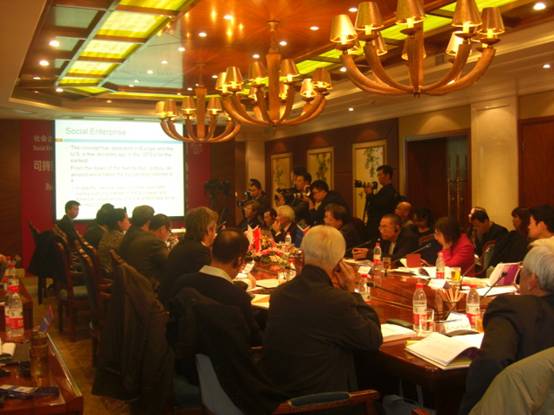Peking University, Nov. 2, 2013: The Social Entrepreneurship Panel discussion was held in the Yingjie Exchange Centre of Peking University on the second day of the three day Beijing Forum 2013.
The discussion focused on research and education on social entrepreneurship and its relevant practical experience with an emphasis on East Asia. The panelists included Jaegu Kim, president of the Korea Social Enterprise Promotion Agency (KoSEA), ten scholars from research institutions in China, South Korea and Japan, and six representative social entrepreneurs, among whom were Xu Yongguang, initiator of the Hope Project who later became the board chairman of Narada Foundation, and Zheng Weining, the president of the Canyou Group.

"The concept of social enterprise had been introduced by the end of the twentieth century, and the government intervened and established the Social Enterprise Promotion Act in 2007”, said Jaegu Kim, president of KoSEA, a public institution which issues certificates to qualified social enterprises and examines the operation of these businesses.
While the Korean government places emphasis on the regulation and legislation concerning social entrepreneurship, the Chinese government is trying to allow the state-owned welfare enterprises more freedom and puts on its agenda the promotion of social enterprises with mixed or private ownership.
Xu Yongguang pointed out that pure government ownership of social enterprises might dampen the enthusiasm of private investors. “To run social enterprises which award bonuses to their employees or private investors makes it possible for one to combine his social ideals with the practical concern about individual development,” said Xu, “only when social enterprises follow such a mode can this kind of entrepreneurship become a career choice for ordinary individuals, and not one which is only attractive to saints.”
Both Jaegu Kim and Xu Yongguang stressed the need for training and education of the social entrepreneurs. In response, the scholars and researchers present pointed out that the research on this field in East Asia was still at a budding stage, but that quite a few universities had begun to offer relevant courses or training programs.
Professor Zongtae Bae, a faculty member from the Graduate School of Management of the Korea Advanced Institute of Science and Technology, outlined a social entrepreneurship MBA program offered by his university. He highlighted three elements of their program, i.e. the careful selection of well-prepared students, a curriculum which features diverse perspectives and experience learning and support for students after graduation. Professor Chan Kamtong from Hong Kong Polytechnic University also acknowledged the value of the practical section in the courses on social entrepreneurship for college students. At the same time, however, he stressed on the necessity for further education of the individuals who were actually running the social enterprises.
The social entrepreneurs present shared their experience in this field in the second session of the discussion. Zheng Weining described how a branch of his company was established and operated in Kashi, Xinjiang. Li Liya, the executive director of Fuping Development Institute and a representative from Leping Social Entrepreneur Foundation, said that her foundation was now co-operating with the Social Venture Partners in the U.S. to create an investment-friendly environment for those who are interested in providing capital for social enterprises. She emphasized that her foundation combined investment with training and continued to facilitate the development of the businesses which they invested in.
Written by: Chen Jiayu
Edited by: Candice Liao